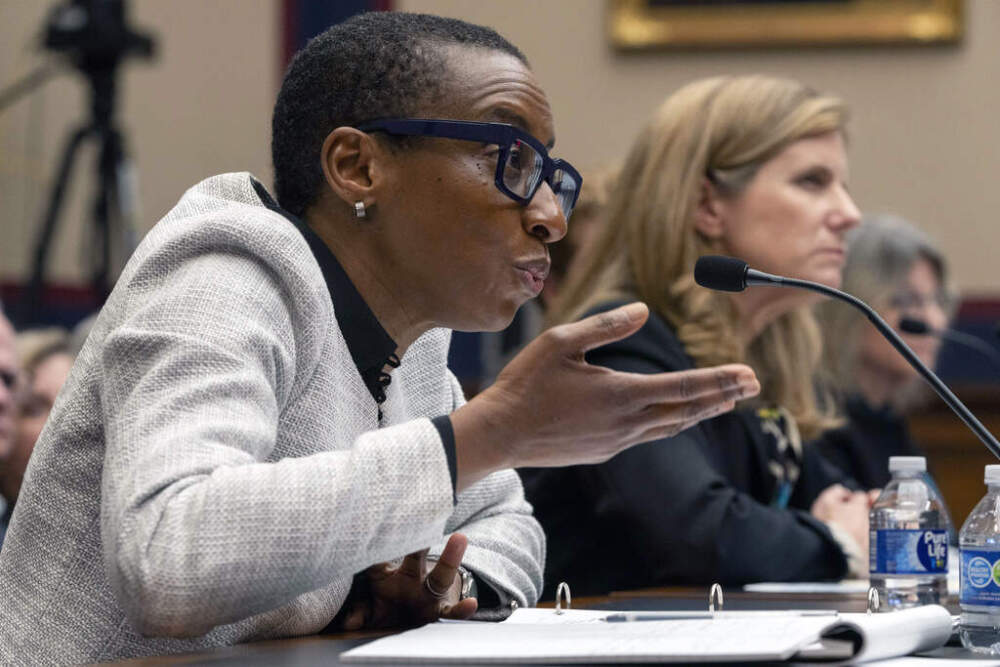Advertisement
Harvard president to amend dissertation following new allegations of ‘inadequate citations’

Additional examples emerged this week of Harvard President Claudine Gay borrowing language, or failing to use proper citations, during her career as a graduate student and political scientist at Harvard.
In particular, right-wing media outlets raised new accusations regarding Gay’s 1997 doctoral dissertation.
Harvard spokesperson Jason Newton confirmed Thursday that Gay's dissertation has been reviewed by the school and that three additional instances of “inadequate citation” were found.
But Newton noted that neither a board-appointed subcommittee investigating the charges nor an independent panel “found evidence of intentional deception or recklessness in Gay’s work.”
That’s a necessary element for a determination of "research misconduct" under Harvard policy.
Still, Gay is facing another wave of criticism — a week after it looked like Gay had weathered a rocky start to her tenure.
Last Tuesday, the Harvard Corporation, the school’s top governing board, affirmed its support of Gay's leadership in the midst of backlash to her Dec. 5 congressional testimony and handling of pro-Palestinian protests and charges of antisemitism on campus.
But even as its members voiced support for Gay, the Harvard Corporation acknowledged allegations of plagiarism in her past academic writings.
In its Dec. 12 statement, the Corporation said it found “a few instances of inadequate citation” in Gay’s work and stated that she would seek four corrections in two articles — from 2001 and 2017 — which she has since done.
Now, in a statement shared with WBUR Thursday, Harvard officials said Gay will make three further corrections — this time to her 1997 dissertation, on racial dynamics in voting behaviors.
Advertisement
The statement also provides the most detailed synopsis yet of the steps the school has taken to examine the plagiarism allegations against Gay, starting from when it first learned of the allegations to the specific university codes of conduct it’s using to judge the claims.
An initial review was sparked Oct. 24 after Harvard said it learned the New York Post was pursuing a story of plagiarism allegations against Gay.
Reviews were conducted both by a Corporation subcommittee and an “independent panel of three experts appointed by the Corporation... among the nation’s most respected political scientists,” according to the school.
The Corporation subcommittee reviewed Gay’s published works from 1993 to 2019, according to Harvard.
But then, on Tuesday, school officials said that they received an anonymous, 37-page complaint outlining dozens more alleged cases of plagiarism in Gay’s writing. The complaint was published by the Washington Free Beacon, a conservative political news outlet, on the same day.
But Harvard said those new allegations were “previously reviewed” by the independent panel, and held that four new allegations were “without merit.” In all, it said “no further action is required” beyond the updates already in progress.
Still, Gay’s harshest critics on Capitol Hill — many of them already upset by her handling of the campus climate since Hamas’s Oct. 7 attacks — said they’re opening up a new inquiry.
In a letter Wednesday, the chair of the House Committee on Education and the Workforce, Rep. Virginia Foxx of North Carolina — who grilled Gay and two other university presidents at a hearing on campus antisemitism earlier this month — accused Harvard of applying a double standard on her behalf.
“If a university is willing to look the other way and not hold faculty accountable for engaging in academically dishonest behavior, it cheapens its mission and the value of its education,” Foxx wrote.
The committee also requested documents bearing on the investigation from Harvard. The fallout from the presidents’ testimony earlier this month led to the resignation of University of Pennsylvania President Liz Magill.
How Harvard handles plagiarism
Harvard has a broad formal definition of academic misconduct — ranging from improper attribution to presenting another person’s work wholly as one's own — for both faculty and students.
But in practice, individual cases of misconduct are handled on a spectrum, according to Ruth O’Meara-Costello, a Cambridge-based defense attorney who represents clients facing university discipline.
O’Meara-Costello, who has represented Harvard students accused of plagiarism, says she has never seen a student be permanently expelled. For the few that were suspended, it was “only when, in Harvard’s view, the dishonesty was very clear,” she said. Students found guilty of charges similar to those facing Gay reliably face lighter penalties, akin to academic probation, she added.
The same is true for Harvard faculty — some of whom O'Meara-Costello has represented. Almost 20 years ago, she noted, two prominent professors at Harvard Law School, Charles Ogletree and Laurence Tribe, were accused of plagiarism. Neither lost their jobs.
That said, Gay is unique in other ways, the attorney said: she is the university’s leader, and spent the past two months facing angry calls from donors, students and faculty on both sides of the Israel-Hamas conflict.
